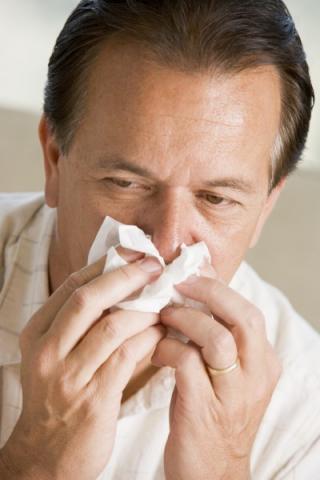PHA reinforces advice on how the public should protect against flu

Latest figures from the Public Health Agency show that flu cases have increased again this week but the level of increase is less than that seen in previous weeks. GP consultation rates for influenza like illness in primary care have increased by 45% compared with 104% in the previous week.
The latest influenza indicators reported between 25–31 December 2010 are:
• GP consultation rates for combined flu/FLI increased from 123.4/100,000 population (updated) in week 51 to 179.5/100,000 in week 52 (45% increase).
• In week 52 (ending 31 December), there were 213 detections of flu; 185 are influenza A H1N1 (2009) and 28 influenza B.
• Flu rates were highest in the 15-44 years age group.
• Respiratory syncytial virus (RSV) weekly detections increased from 23 (updated) in week 51 to 68 in week 52.
More information can be found on www.publichealth.hscni.net/publications
PHA is continuing its efforts to urge ‘at-risk’ groups and pregnant women to get vaccinated against flu, following increasing levels of flu cases in the community. While H1N1 is the main strain of flu circulating, we are seeing cases of other flu strains which can also be prevented by the seasonal flu vaccine. Vaccine policy is clearly set out by DHSSPS on the advice of the national Joint Committee on Vaccination and Immunisation (JCVI) which advises all UK Health departments on immunisation policy. Details on who should get vaccine are included at the end of this message.
The PHA is also advising the public to take extra measures to reduce the risk of catching or spreading the flu virus, particularly when most people have returned to work and children are back at school after the Christmas holidays.
Dr Lorraine Doherty, Assistant Director of Public Health (Health Protection), PHA said: “We have seen a rise in the number of seasonal flu cases. However, flu cases are still not as high as seen during 2008/09 or during last winter’s flu pandemic. Nevertheless, a number of people are ill in intensive care units with flu and it is thus important that every effort is made to prevent flu transmission in the community. The PHA would like to advise the public of how everyone can play their part in preventing the spread of this highly infectious disease.
“If you do get flu this year, our advice is to stay at home and don’t spread your infection to others. Rest, drink plenty of fluids and use over-the-counter remedies if they make you feel more comfortable. GPs and hospitals are busy dealing with flu cases, so I would emphasise that people should stay at home and contact their GP only if their condition worsens or if they are in an ‘at risk’ group or pregnant and not recovering. Do not visit relatives or friends in hospital if you are sneezing, have a cough or have other symptoms of flu-like illness."
Dr Doherty continued: “Receiving the seasonal flu vaccine is the best way to protect yourself and others from getting the virus. So, if you are in an ‘at-risk’ group, get the vaccine now – it’s still not too late. I would like to stress that vaccines are still available and pregnant women in particular, no matter what stage of pregnancy, should receive the vaccine, even if they received the swine flu vaccine last year.”
The public can also take simple effective measures to protect themselves. The flu virus is spread in the small droplets of saliva coughed or sneezed into the air by an infected person. If you breathe in these droplets, you may become infected, but this spread can be prevented. Use a tissue to cover your mouth and nose when coughing or sneezing, throw the tissue in the bin and wash your hands as soon as you can. These measures can help prevent all flu and flu-like illnesses.
For further information and advice on flu visit www.publichealthagency.hscni.net
Contact the PHA Press Office on 028 9031 1611
Arrangements for surveillance of influenza are well developed across the UK. The PHA publishes the flu bulletin for Northern Ireland throughout the season. This is available on the PHA website at www.publichealth.hscni.net/publications
During last year's pandemic, additional data collection was undertaken to identify deaths related to the H1N1 2009 pandemic (swine flu) virus and these deaths were reported in the bulletin. Now that the pandemic has been declared over by WHO, we have returned to customary reporting of seasonal flu mortality as detailed in the weekly flu bulletin. Although a death from H1N1 in 2009 may occasionally be reported in the media, there will be no cumulative total of deaths from any of the types of influenza viruses, as additional data is no longer collected and any figures would be incomplete and misleading.
Who should get the flu vaccine?
• Anyone aged 65 or over.
• Children and adults who have any of the following medical conditions:
- a chronic chest condition such as asthma;
- a chronic heart condition;
- chronic liver disease;
- chronic kidney disease;
- diabetes;
- lowered immunity due to disease or treatment such as steroids or cancer therapy;
- a chronic neurological condition such as stroke, multiple sclerosis or a condition that affects your nervous system, such as cerebral palsy.
• Pregnant women regardless of their stage of pregnancy.
• Anyone living in a residential or nursing home.
• If you are the main carer for an elderly or disabled person.
Flu symptoms
If you've got flu, you're likely to develop some or all of the following symptoms:
• a sudden fever, with a high temperature (generally above 38°C/100°F)
• a chill
• a severe headache
• muscle aches and pains
• a sense of feeling weak and tired
• a dry cough
• a sore throat
